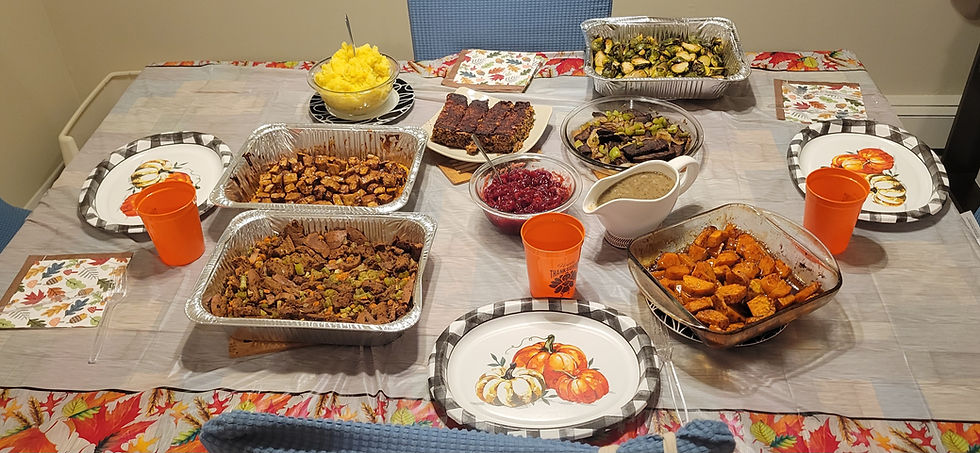How To Set Boundaries Without Feeling Selfish
- Jennifer Shlomovich

- Jul 16
- 7 min read

As a recovering people-pleaser, I remember how hard it was for me to say "no" to others. I would frequently compromise my own needs because of the guilt, fear, shame, and anxiety that I felt if I let somebody down.
I would say "yes" when I really wanted to say "no". When making plans, I would tell others I had no preference what we did, even though deep down I did have a preference. I was afraid of choosing something and having it be the wrong choice. I would feel resentful of this, because I believed I couldn't express how I felt. I would then feel upset when others did not anticipate my own needs, because I was always anticipating theirs.
For a long time I didn't know who I was or what I really wanted. I thought I did. In reality I didn't. When you don't know who you are, it is easy to take on the beliefs of other people. I grew up being told who to be consciously and unconsciously. When I undid that programing, I went through a period of feeling lost. I knew who I wasn't, but I didn't know who I was. I needed to go on a different journey to find myself.
Growing up, I was expected to be the "good one". This meant I was supposed to put up with things I didn't really like and not speak up about them. For the first 30 years of my life I allowed people to steamroll all over my feelings. I felt that my needs didn't matter and that everyone else was much more important than me.
This mindset caused me a lot of stress and lead to me taking on toxic relationships. I would ignore red flags in others, and justify their poor behavior. Constantly minimizing my thoughts, feelings, and emotions. Shrinking myself down until I couldn't take it anymore.
I am the complete opposite of this now! You can read more about my journey out of people pleasing here in a previous post.

Yesterday I did a blog post inviting readers to ask me anything. I received different questions about boundary setting and people-pleasing. Reading these over inspired me to work on a series addressing boundaries and people-pleasing. This is the first post in that series. The other posts will follow soon.
Setting boundaries and eliminating people-pleasing has a lot of layers to it. In this post, I want to address the common reason why many people struggle with setting boundaries and people-pleasing. That reason is they feel selfish for prioritizing their needs over someone else's. The truth is, when we take care of our needs, it allows us to be there for others in a better way.
When a plane is about to take off, the flight attendants always remind us that if we need to put on the oxygen masks, we need to out ours on first before assisting anyone else.
What are boundaries and why are they really important?
Boundaries allow you to advocate for yourself and your needs. When you do not set boundaries, stress and chaos can take over your life. People may intentionally or unintentionally cross our boundaries. In order for people to know what our boundaries are, it is up to us to communicate them. When someone crosses our boundaries, it is up to us to enforce them. Saying no and communicating our needs does not make us bad people or selfish. If we communicate our needs respectfully and there is pushback and disrespect in response, most likely that person was benefiting from you not setting those boundaries.
Are you feeling the following about someone or something?
Irritable
Triggered
Angry
Annoyed
Stressed
Burnt out
Frustrated
Dread
If so, there are most likely boundaries that need to be put in place.
So how does one NOT feel selfish for prioritizing their needs?
First of all this is going to be a process. If your automatic response is to ignore what you want, so people can have their way, then setting boundaries is going to feel uncomfortable in the beginning. This skill takes time to cultivate and develop. It is like going to the gym and using your muscles in a different way. In the beginning it might feel difficult. The more you do it, the better you will get!
Also, you may not ever fully get rid of the feeling of guilt, when setting boundaries with people. I still can feel this way sometimes. The key here is not allowing those feelings to get in the way of what is important to you. Therapy and coaching can help you more with working through these feelings and moving through them.
Important Note About Abusive Situations: If you are in an abusive situation, please get help and assistance with creating a safety plan for yourself and any other loved ones that are impacted. A great book that helped me with navigating abuse is "Why Does He Do That? Inside The Mind Of Angry and Controlling Men" by Lundy Bancroft: I will forever be grateful for this book and what it did for me. Lundy Bancroft's website is also an amazing resource. Click here to check that out.
My Process For Setting Boundaries
Getting clear on what you want and why it is important to you is an important foundational step to be able to accomplish this. If people can't respect what is important to you, then it is probably time to assess that relationship and the role that person will play in your life moving forward. This can be especially tricky with family and co-workers. In those situations it is important to address how you can have a relationship with this person on your terms. Why do you need to interact with them and how can you do it in a way that supports you?
Journaling: It is important to get clear on how your needs are not being met and what you need to put in place so they will be met. Is someone behaving in a way that is upsetting you? How can you address this in a tactful way? Are you being pulled in too many directions and need to be more intentional with your time?
Communication: Once you are clear on your feelings and what is important to you, then it is time to take action and communicate what it is that you want. It is very important that you have your end goal in mind when doing this. You are basically setting the expectations that you want people to have on you moving forward. You might get some pushback at the beginning, especially if people are used to you frequently caving in to what they want. Preparing yourself for this, will help you counter it in a more confident way.
Reinforcing: Once you communicate your needs and what needs to be done to accomplish this, it is then important to stick to it. It might feel difficult at times and you might cave in. This is okay! Be kind to yourself and reinforce next time. Remember this is a process that is going to take time, because it is a new way of being for you. It is important to have a plan in place so you can reinforce more effortlessly. Think about the types of pushback you might get. What will make saying "no" more difficult for you? What will help you stick to your plan?
Useful Journal Prompts To Help You Get Started
What situations or relationships in my life currently feel draining? What might I need more or less of in these areas?
What does feeling “nourished” emotionally, mentally, and physically look like to me right now?
When was the last time I felt truly at peace or energized? What was present in that moment—and what was missing?
If I could say yes to myself more often, what would I say yes to today?
What needs have I been ignoring or downplaying in order to keep others comfortable? How has that affected me?
What comes up for me (emotionally or physically) when I even think about saying no? What does that reveal?
What fears or beliefs do I hold about what might happen if I say no? Are they true or inherited?
What would it look like to say no from a place of self-love, not guilt or fear? Can I describe how that version of me would speak?
What boundaries would support my well-being right now—and where might I start enforcing them gently?
How does saying no to others actually create space for saying yes to myself?
What is one boundary I need to express more clearly—and how can I communicate it in a way that honors both myself and the other person?
When someone pushes or ignores my boundary, how do I typically respond—and how would I like to respond moving forward?
What reminders or affirmations help me stay grounded and confident when I reinforce a boundary—even if others don’t respond well?
Resources & Support
"Setting Boundaries Will Set You Free" by Nancy Levin: I read this book back in 2023. I was already pretty good at boundary setting at this point. I wished this book had existed earlier on in my journey. It has so many great insights and exercises in it! I still got a lot of value from it. I learned more about myself and my boundary setting skills definitely advanced further after reading this book. It is great read wherever you are in your boundary setting journey!
"You Are A Badass: How To Stop Doubting Your Greatness and Start Living An Awesome Life" By Jen Sincero: In 2016 I was settled into life being remarried and was sorting things out in my career. This book helped inspired me to reprioritize somet things in my life and take some big leaps.
What areas in your life do you need to set more boundaries? What future blog posts would you like to see from me on this subject?


.png)
.png)
.png)



I think many of us have boundary problems. When you said yes when you meant no and could not state you have a preference, you remind me of a friend. She could not state a preference. It is like pulling teeth. Even for a simple what restaurant, she would not choose. It is most frustrating. I'm not sure if that's a boundary problem.
I had a hard time setting boundaries at work because I didn't want to get in trouble or people to think less of me. Now that I'm self-employed, it's less of a problem! Thanks for sharing your journey and helping other see that there is another way.
Some of your statements feel familiar. Recently I had to deal with a pushy and demanding client, and managed to set boundaries when I felt she was monopolizing my time. I told her beforehand "we have one hour today" or "what you're suggesting is beyond the gray area, and I won't support it, but feel free to get a second opinion with your trustee" (who I knew full well, would side with me, haha!).